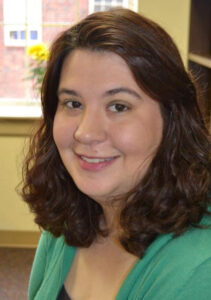In every job interview since I graduated from seminary, when asked the question, “What are your long-term career goals?” I have always answered, “Directing a spiritual care program with older adults at a retirement community or in a memory care facility.”
On Aug. 28, I stepped into a new role as director of mission and ministry at Eaton Senior Communities and pastor of West Alameda Community Baptist Church in Lakewood, Colo. The Department of Mission and Ministry is responsible for the spiritual dimension of wellness at an affordable housing community for seniors over the age of 62. And the church has been meeting in the multipurpose room on-site since the sale of their land to build Eaton Senior Communities in response to an invitation they discerned from God to create affordable housing options for senior adults.
I’m filled with wonder at the mysticism of connection as I think about my first call as associate pastor of Scott Boulevard Baptist Church in Atlanta, a congregation that also made the radical, difficult and loving decision to sell their land and invest in the spiritual lives of older adults.
When I began my work with the Scott Boulevard church, they were in a time of transition that included the sale of their property to a developer and a move down the street to rent office and chapel space from a larger church. As I begin this new role with the West Alameda church, I am mindful that, once again, I am entering into their midst during a time of transition.
Pastoral transitions are often very difficult, and this little congregation would agree.
Pastoral transitions are often very difficult, and this little congregation would agree. With resilience and grit, the West Alameda church has come through saying goodbye to a much beloved pastor and welcoming a new one warmly and graciously, even amidst their grief.

Sara Robb-Scott
The Scott Boulevard church sold their building in faith that ministry to older adults, particularly homebound older adults, would emerge from the rubble. But I don’t think any of us had a notion of the meaningful ministry we would build together. I arrived for work on my first day and was handed a piece of paper with four bullet points delineating the directions the church discerned were God’s directions for their future.
Amidst the grief over a building, built by many of the late husbands of the women into whose homes and lives I was so graciously welcomed, a community learned to trust God and one another. And they learned to trust me, a brand-new associate pastor, as well as the leading of the Spirit into a ministry that rippled throughout our community. These ripples were louder and more hopeful than the sounds of demolition of the beautiful brick building on the corner of Scott Boulevard and North Decatur Road. Louder than the ageist notion that seniors have little to give back to the life of the church or the notion that ministries supporting the ongoing spiritual formation of senior adults are luxuries at best and exercises in futility at worst.
My pastoral practice largely has been with adults, predominantly older adults, and so my praxis for supporting the unique spiritual needs of older adults is grounded in grief theory and phenomenology, or finding meaning in lived experience.
Older adults experience many losses — physically and emotionally — over the course of the aging process, and there is much to learn about best ways to address the unique spiritual needs of seniors in faith communities. These include tending to loss, grief, joy and celebration. My new congregation right now has ample opportunity for all.
I get to spend my week planning sermons, worship services and opportunities for the ongoing spiritual formation of seniors in my little corner of the world. This is neither luxury nor futility. It is a necessity — a special and deeply meaningful opportunity of which I am so honored to be a part.
Faith communities that take seriously the ongoing spiritual formation of senior adults … are pioneers in combatting ageism, which is a particularly sneaky contributor to aging-related loss and grief …
The aging experience is peppered with loss and grief. Faith communities that take seriously the ongoing spiritual formation of senior adults — particularly those that take the time to imagine creative ways to support spiritual resilience and growth among their elders — are pioneers in combatting ageism, which is a particularly sneaky contributor to aging-related loss and grief, even in faith communities. In the words of my New Testament professor, Thomas Slater, “They are not far from the kingdom.”
My first days in this role are being spent tending to grief about the recent pastoral transition while simultaneously helping congregants of West Alameda Community Baptist Church and residents of Eaton find ways to hold hope and dreams for the future in the same hearts that house their grief.
I’m increasingly aware life doesn’t slow down for lament. I’m also deeply convinced lament is as important a spiritual practice as any other, and facilitating lament in faith communities, particularly older communities, is key in ongoing spiritual formation and nurture.
For a guide on how to engage lament and joy in the life of congregants of any age, we need look no further than Advent and Lent. Each liturgical holiday season follows a path of somberness and reflection toward culmination in a joyous event. Each of our lives is a journey with laments and joys along the path, as well as opportunities to celebrate and mourn at every turn.
It’s often overwhelming to think about endeavors to create new specialized programming within faith communities. A community can take simple steps to intentionally incorporate seniors into existing programming.
Some practical ideas include highlighting in the church bulletin a different senior each month who is unable to physically attend worship, listing a favorite hymn, Scripture and a time in life where their faith helped them through. Intentional Sunday school planning allows for intergenerational engagement, such as conducting spiritual life reviews together using Richard L. Morgan’s Remembering Your Story.
Preachers will want to take inventory of their preaching and do the difficult work of considering which processes of tending to Scripture may need adjustments for greater accessibility across generations.
Faith communities with a lot of seniors who are unable to attend a physical worship service due to health or mobility issues can find great meaning in having a team of volunteers connect weekly with each person, reporting back to the church staff with any pastoral issues that need to be addressed. Both churches led by single-staff pastors and multi-staff churches where the work of caring for senior adults is shared can develop ways to ensure that even though some members are limited in being able to gather with their church in person, they are not forgotten by their faith community or by God.
Other ways of ensuring that people feel cared for by their church across the spectrum include blessing new grandparents, as well as services of lament like All Saints’ Sunday and Longest Night services, also commonly known as Blue Christmas services. For faith communities who long to look seriously and with integrity at the ways in which care for seniors can be increased or improved, the gifts of creativity are readily available.
In Psalm 71:9, the Psalmist pleads with God, “Do not cast me off in the time of old age; do not forsake me when my strength is spent.” The Psalmist’s request of God is a plea to churches as well. Let’s not cast aside the elders among us for younger programming and bodies in pews. Let’s remember them as the Lord has remembered us in our grief and in our joy.
As I step into this role at Eaton and at West Alameda Community Baptist Church, I’m grateful and excited. I’m also grieving the community of faith my husband and I left behind in Durham, N.C., and colleagues who quickly became friends. I’m constantly learning to hold my own joy and lament while making space in my arms to help hold the joy and lament of others.
Thanks be to God for all of it.
Sara Robb-Scott serves as director of mission and ministry at Eaton Senior Communities and pastor of West Alameda Community Baptist Church in Lakewood, Colo. She lives in Aurora with her husband, Andrew, and their cat, Reesee. Sara blogs at sararobbscott.substack.com
Related articles:
Making a covenant with aging parents
As the American population grows older, church ministries need to shift


